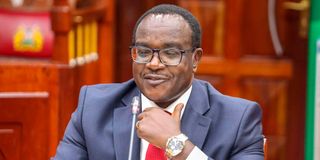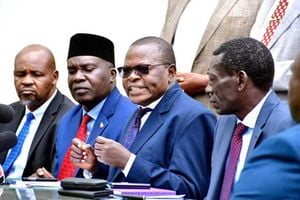
Education Cabinet Secretary Julius Migos Ogamba.
When the new Cabinet Secretary for Education Migos Ogamba appeared before the National Assembly Committee on Appointments, he said that the education sector is bedeviled by three key problems.
These, he said, are lack of enough teachers, lack of engagement of parents and inadequate infrastructure in learning institutions.
Mr Ogamba could not be further from the truth, as the sector is reeling under a myriad of challenges.
The CS has his in-tray full and work cut out. Due to the nature of his predecessor Ezekiel Machogu’s exit, Mr Ogamba did not have the privilege of receiving handover notes and tips on what to pursue or avoid. He comes into office just a day after the two main teachers’ unions issued a strike threat when schools open for third term in two-week’s time.
Teachers’ strikes are usually disruptive, and in the ird term, it is even worse because it is when candidates for various national examinations prepare for the tests. No parent wishes their children to be disrupted either before or during national examinations because this portends life-defining consequences.
Grievances
Although most of the grievances the teachers have raised require to be addressed by the Teachers Service Commission (TSC), a constitutional independent commission, as head of the education sector, Mr Ogamba must step in to avert the strike before it is too late.
The main problem [in education] is funding. There isn’t enough money to cover all programmes and all the learners. I asked myself, do I know what I’m getting myself into and I answered that someone has to do the job.
The CS might need to look into how previous ministers for education handled strikes and how many lost the battle.
Mr Ogamba deputised Mr Machogu as they (unsuccessfully) sought the Kisii gubernatorial seat. Just like his predecessor when he took office in 2022, he has no time to settle down before the administration of the Kenya Certificate of Secondary Education (KCSE) examinations. He will be expected to deliver a credible examination following previous queries about integrity.
Learners, parents, teachers and other stakeholders are keen to see how Mr Ogamba manages the transition to Grade 9 (the last class of junior school under the competency-based curriculum). During his vetting, he hinted at a hybrid of some learners being in the current set-up of primary schools and others being accommodated in secondary schools.
Transition to junior school has been problematic from the beginning. More important than where JS is domiciled is the concern over whether the students are learning or not. Are they prepared for senior school where they are supposed to specialise before they proceed to tertiary education? It is a question of the quality of education.
“I’ll only change policies that aren’t working at the [Ministry of Education]. The government is one, so continuity is important,” Mr Ogamba said when asked by Samburu West Member of Parliament Lesuuda Naisula whether he will change policies like some ministers have done.
Apart from changing the policies that do not work, the CS must be resolute in enforcing the implementation of those often flaunted. He might need a quick look into how managements of schools utilise the finances they receive from the government and parents. The audit and quality assurance functions at the ministry have been called in to question in the past.
“The main problem [in education] is funding. There isn’t enough money to cover all programmes and all the learners. I asked myself, do I know what I’m getting myself into and I answered that someone has to do the job,” Mr Ogamba said.
He acknowledged the woes caused by dwindling capitation although the Constitution guarantees free and compulsory basic education. He pledged to coordinate with the National Treasury to have the funds released on time and in totality and that parents would not be charged any extra levies.
Safety guidelines
Mr Ogamba will also have to deal with adherence to the health and safety guidelines, especially because of the challenges posed by congestion that many schools face.
In higher education, the most urgent issue is the funding model introduced last year which has come with its attendant teething problems. Many stakeholders still question the criteria used to award the funding and the loan burden the model loads on students upon graduation. He blamed apparent poor communication for the challenges the model has so far faced but the issues run deeper.
He, however, admitted that the means testing instrument used to categorise students is not perfect and is “still work in progress”.
“If you’re able to fund your education, then based on the fact that you’re able to, you should not be financed by government. If this unbundling was done properly, then the public would understand,” said Mr Ogamba.
Since the new CS lacks experience in the education sector and public service, having been an advocate and politician throughout his career, he is lucky to have the report on the Presidential Working Party on Education Reforms at various stages of implementation. How he completes the task will, in a big way, define his legacy at Jogoo House.








